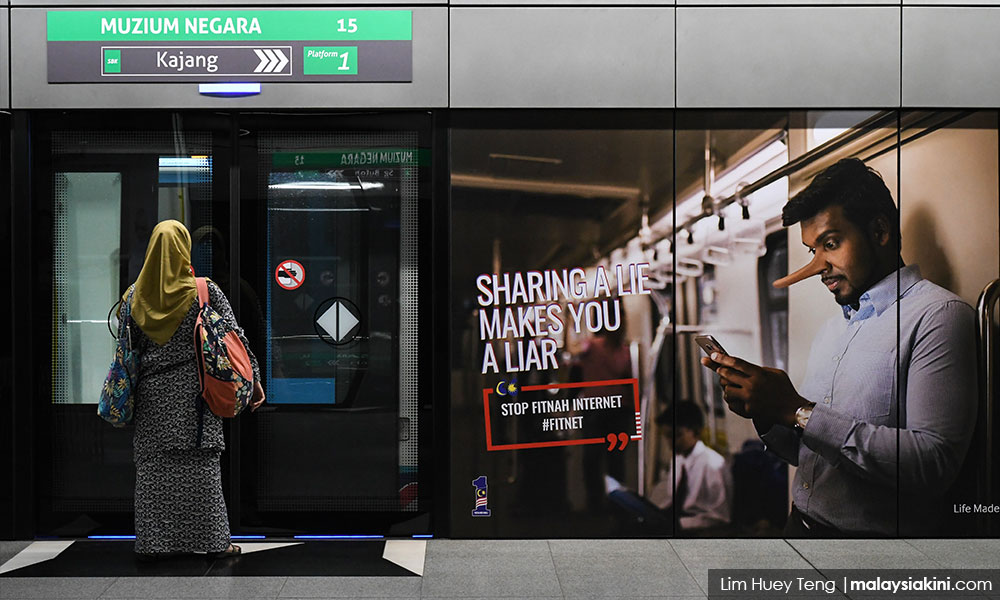The government of Malaysia must immediately seek to repeal the Anti-Fake News Act 2018 as it is dangerous to the exercise of freedom of expression in the country, a human rights group has said.
According to the Article 19 group, the new Act and "the criminal offences it contains" will likely have a chilling effect on open debate, "in particular on criticism of the government, and especially online."
It added that the timing of the gazetting of the Act, about a month before the country heads to the polls and which was rushed through Parliament without adequate public consultation, sent the message that "opposition and criticism will not be tolerated" by the caretaker government.
This was stated in a legal analysis of the Anti-Fake News Act published by Article 19 yesterday, which found it to be in contravention of international human rights standards, in particular the International Covenant on Civil and Political Rights (ICCPR).
"The Malaysian government must prioritise the repeal of the act in its entirety and immediately take steps to ensure that individuals can exercise the right to freedom of expression without fear of retaliation," Article 19 said in a statement.
According to its Asia Programme head Matthew Bugher: "Malaysian authorities haven’t fooled anyone by fast-tracking the passage of this disastrous law in the days before the dissolution of Parliament. Their intention to use the law as a political weapon in the run-up to the general election is clear.
"The act constitutes yet another repressive tool at the disposal of a government increasingly bent on stamping out all forms of criticism and dissent."
'Bold-faced attempt to silence critics'
Calling the Act a "bold-faced attempt to silence critics", Bugher opined that the new law only raises more questions than it answers.
Aside from the complete repeal of the Act, Article 19 is calling on the government to comprehensively reform other laws that unjustifiably limit rights to freedom of expression, in particular, the Sedition Act 1948 and Communications and Multimedia Act 1998.

It also wants legislation to be enacted to protect online intermediaries, such as search engines and social media companies, from liability for content published by a third party, and the International Covenant on Civil and Political Rights (ICCPR) to be ratified.
The intentional ambiguous legal duties of "truth" and what constitutes "fake news" and the "draconian" ramifications stated in the law, it said, creates a powerful instrument for the government to control public discourse, including journalism, online discussion and debate.
This, it said, would make it impossible for the author or potential distributor of potential "fake news" to know if they would be held liable under the law and thus, pave the way for the potential arbitrary application of the law.
Falsity not a basis to limit freedoms
Article 19 added that falsity of information is not legitimate basis to restrict one's freedom of expression, citing artistes engaging in satire or parody, or a blogger's sharing of a politician's "false" news to inform readers of the fact such a statement was made, as examples of those who could run afoul of the new Act.
Among other aspects of the act that raised Article 19's concerns are Section 5 of the Act, which criminalises the rendering of financial assistance, and seemingly targets those who donate to media outlets engaged in investigative journalism or civil society organisations.
It also took issue with Section 3, which extends the scope of the law to the foreign press, and thereby limits Malaysians' access to international source of information.
Instead, the Article 19 analysis pointed out the availability of non-coercive means to counter false information – including supporting media pluralism and independence, educating the public on media and digital literacy, and enacting of policies to ensure government officials disseminate trustworthy information.
The sudden tabling of the Anti-Fake News Bill in Parliament raised the concerns of press freedom groups in Malaysia, as well as global watchdogs, all of whom decried the bill as Putrajaya's move to crack down on freedom of the press and freedom of speech.
The contentious Act came into force on April 11, making Malaysia the first country in the world to pass a law specifically targeting the dissemination of "fake news," a term made popular by United States President Donald Trump.

